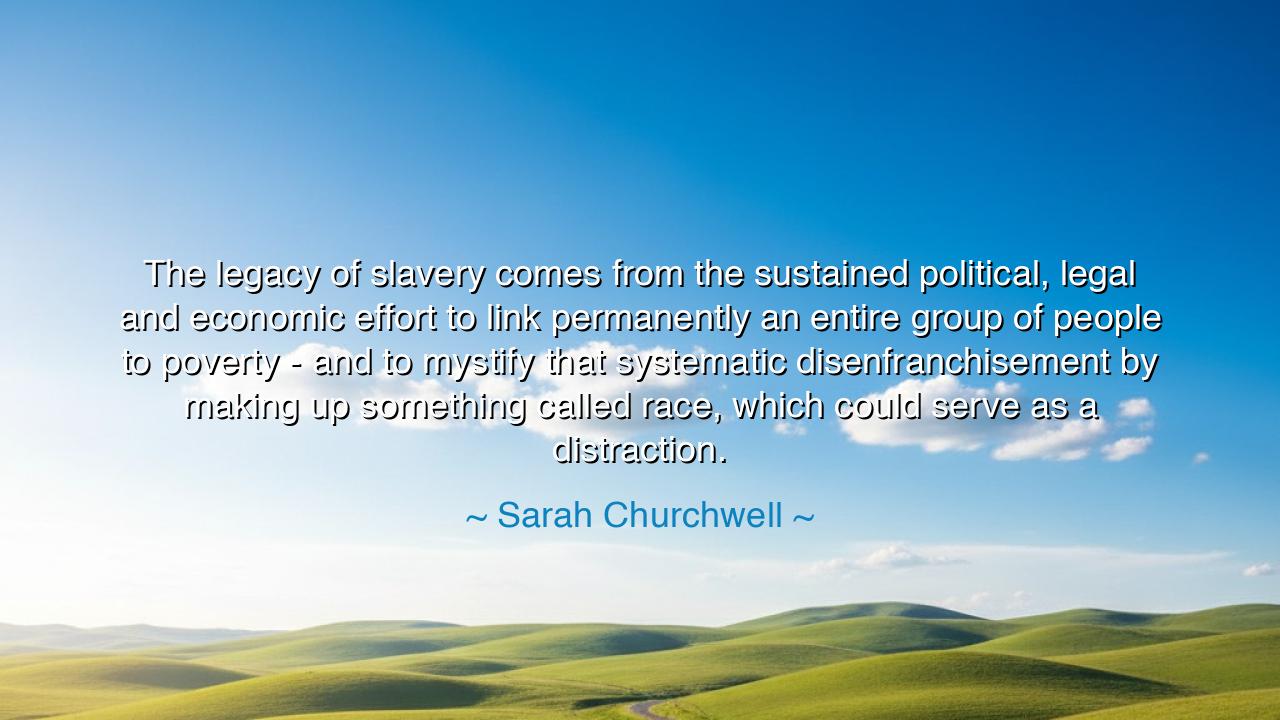
The legacy of slavery comes from the sustained political, legal
The legacy of slavery comes from the sustained political, legal and economic effort to link permanently an entire group of people to poverty - and to mystify that systematic disenfranchisement by making up something called race, which could serve as a distraction.






In the sacred halls of human memory, there are wounds that do not fade with time, for they are not carved upon the flesh but upon the spirit of nations. So speaks Sarah Churchwell, when she declares: “The legacy of slavery comes from the sustained political, legal and economic effort to link permanently an entire group of people to poverty — and to mystify that systematic disenfranchisement by making up something called race, which could serve as a distraction.” These words unmask a long deception, one woven through centuries — the idea of race as a weapon, forged to conceal the true machinery of oppression. It is not merely a reflection on history, but a revelation of how systems cloak injustice in illusion, turning false divisions into chains that bind the mind as tightly as iron once bound the body.
For what is slavery, if not the deliberate attempt to make poverty eternal? It was never content with owning labor; it sought to own identity itself. From the plantations of the American South to the sugar fields of the Caribbean, laws and policies were crafted like invisible cages, ensuring that even when chains were broken, dependence remained. Churchwell reminds us that this was no accident — it was a sustained political, legal, and economic effort, a deliberate architecture of inequality built stone by stone across generations. And when the cruelty of that system risked exposure, the architects of oppression created a distraction — the myth of race, a lie told so often it became a language of division.
Consider the tale of Frederick Douglass, born into slavery, denied education, beaten for seeking knowledge, yet rising to become a voice of thunder against the injustice of his time. He understood the truth that Churchwell now names — that slavery was not simply a matter of forced labor, but of systematic disenfranchisement, maintained by the illusion that certain humans were less than others. Douglass saw clearly that race was a curtain, drawn to hide the true stage of exploitation. Behind it stood the real engine: power seeking profit, greed cloaked in righteousness, wealth built on human suffering. And when that curtain was finally torn by abolition, those who profited from the system did not vanish — they merely changed their garments, creating new laws and new ways to keep old hierarchies alive.
Churchwell’s words echo like prophecy through the centuries. The political power that once passed laws to preserve bondage became the political will that resisted civil rights. The legal barriers that once defined ownership of flesh transformed into discriminatory policing and sentencing. The economic machinery that once harvested free labor evolved into predatory wages and systemic exclusion. Thus, the legacy of slavery endured, not as a ghost of the past, but as a living structure woven into the foundations of modern society. Race, she says, was invented not to explain difference, but to justify domination — a distraction so powerful that it turned neighbor against neighbor, while the true oppressors sat unseen, counting their profits.
This truth, though ancient, remains urgent. For every era invents its own myths of separation. Where once race was the tool, today it may be nationality, faith, or ideology. The names change, but the pattern remains — those in power mystify oppression by turning suffering into suspicion, by convincing the poor that their brothers are their rivals. And yet, if one looks beyond the illusion, one sees the same hand moving the pieces, linking entire peoples to hardship through the same old machinery of fear and control.
Let the story of South Africa’s apartheid remind us how far such deception can go. The laws that separated black from white, that dictated where one could live or learn, were not born from hatred alone — they were born from economic design, ensuring cheap labor and perpetual poverty. And even when those laws fell, the legacy remained in the soil, in the schools, in the hearts of generations. So too, in America and beyond, the shadows of slavery still stretch across centuries, reminding us that freedom is not a moment won, but a structure rebuilt.
Therefore, let the lesson of Churchwell’s wisdom be this: truth must unmask illusion. Do not be deceived by names or colors, by flags or bloodlines. Seek always the deeper cause — who profits, who suffers, who hides behind the veil. To break the legacy of slavery is not only to remember the chains, but to expose the cunning that forged them. For every lie about race is a barrier between souls, and every time we see through that lie, we restore a piece of our shared humanity.
And to those who inherit this world, the call is clear: do not turn away from history’s wounds, for they are the map to justice. Stand where truth is buried, and uncover it. Refuse the distraction of division, and see your reflection in every oppressed face. Only when we name the deception and dismantle its design can the descendants of the enslaved — and the enslavers alike — find redemption. For in truth, there is freedom, and in unity, there is the power to break every chain.






AAdministratorAdministrator
Welcome, honored guests. Please leave a comment, we will respond soon